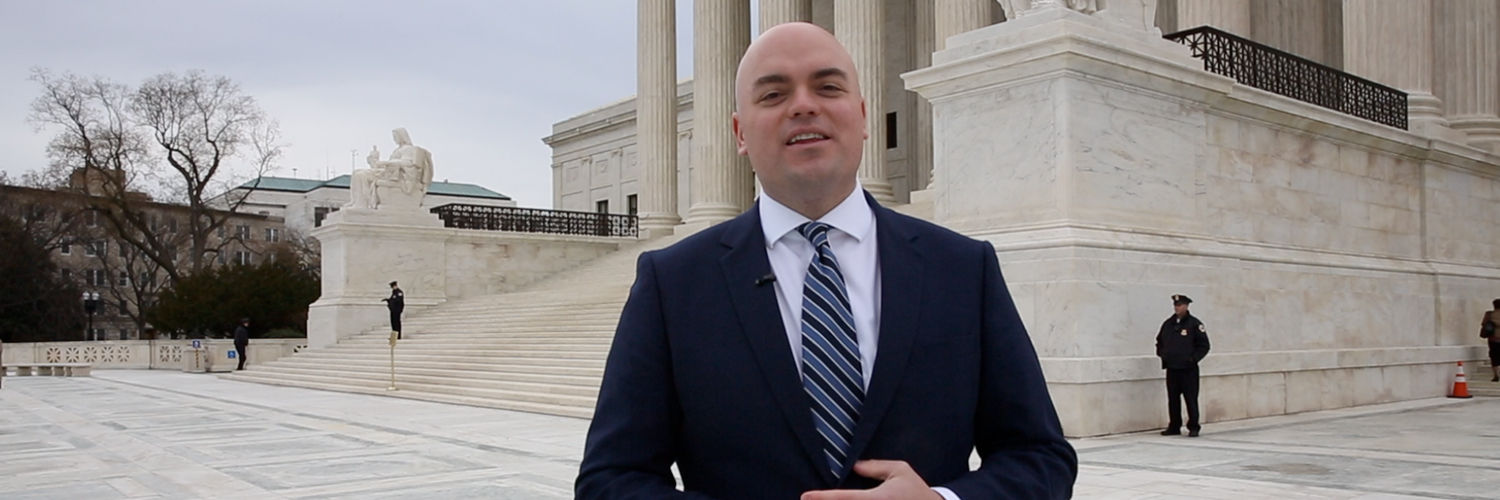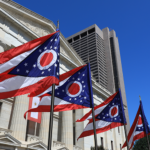On Monday, the U.S. Supreme Court heard argument in Janus v. AFSCME, a case that could end compulsory unionism for public employees nationwide. The national spotlight has been focused on the Court all week, and I had the great fortune of attending the argument.
It was a lively one.
Bill Messenger of the National Right to Work Legal Defense Foundation argued for Mark Janus, the Illinois public employee challenging state law compelling him to pay a union, AFSCME, an “agency fee.”
Here is a quick update from the steps.
In 1977, the Supreme Court in Abood v. Detroit Board of Education upheld state laws that compel the payment of agency fees, which ostensibly cover the cost of collective bargaining and contract administration. According to the Abood ruling, fees for these categories of union expenses can be “charged” to all employees in a unionized bargaining unit. However, the justices held that unions may not charge union nonmembers for the overtly political and electioneering activities they engage in.
This ill-defined line between chargeable and nonchargeable expenses has led to a litany of follow-up cases that all struggle with the same basic question: Which public-sector union activities are political, and which aren’t?
In the case now before the Court, Janus argues the premise to the question is wrong and all government union activities are inherently political. That makes perfect sense because bargaining with the government over employee wages, benefits, seniority and tenure protections, pension guarantees, etc., all dramatically impact public policy and the public fisc.
Even a chargeable agency fee forces an employee like Janus to support the political speech of the union at the bargaining table, and he argues such compelled fees are unconstitutional under the First Amendment.
Of course, he is correct.
Messenger presented a fine argument on his behalf, and several of the justices were prepared to do battle, armed with questions that occupied the majority of his time.
Justice Ruth Ginsburg opened up the volley of questions that betrayed, in my opinion, a misunderstanding about the effect this decision could have on private-sector agency fees. The answer, as Messenger pointed out, was none
Private sector employees are governed by the National Labor Relations Act, which isn’t at issue in this case.
Justice Sonia Sotomayor followed with a barrage of very combative questions. The primary thrust was: Why is it that the government is given considerable discretion to manage its affairs as an employer, but they can’t decide to permit agency fees as a means of managing their labor relations? For instance, it can fire employees. Why can’t the government, in its discretion as an employer, agree to agency fee contract provisions, which advance labor relations management effectively?
Justice Stephen Breyer, seemingly trying to broker a compromise, asked a multi-part question involving subjects already in discussion, but seemed irked throughout the entire argument that no one was satisfactorily answering his questions.
Finally, Justice Elena Kagan, always the strongest of the four liberal stalwarts, asked about “reliance interests.”
Janus is asking the Court to overrule a 40-year-old precedent, Abood. Abood’s agency fee framework has allowed thousands of union contracts to include compelled union fee provisions. In effect, Kagan was asking, “If we strike down Abood, how many thousands of contracts would be voided, how much money would unions lose, how many government-administered fee-seizure programs would be declared unconstitutional, etc.?
As a legal matter, when courts are considering overturning a precedent, they consider how much reliance is placed on that precedent.
It’s an interesting question with an easy answer: If Abood is wrong as a constitutional matter, it doesn’t matter how big the reliance interests are.
Messenger fielded the questions well and reserved a few minutes for rebuttal argument.
Next up, U.S. Solicitor General Noel Francisco argued for the United States, which supports Janus.
This is notable because, during the previous administration, the federal government’s attorneys supported the imposition of agency fees under Abood.
Sotomayor, very obviously displeased with the United States’ change of heart, asked General Francisco how many times the administration had flipped position in the past year.
Perhaps the better question would have been, how many times did the prior administration’s legal mistakes have to be corrected in the last year?
Nevertheless, it was great to have the support of the federal government on the side of free speech.
The attorney for Illinois spoke next, and he received sharp questions from Justices Anthony Kennedy and Samuel Alito, and Chief Justice John Roberts. Among other things, the attorney suggested that in non-agency fee states, unions are smaller, more militant and more interruptive of core government services. (This is patently false, as one of the amicus briefs filed in the case by the Freedom Foundation clearly explained.)
When the union’s attorney argued that eliminating agency fees would result in unions becoming more politically militant, Chief Justice Roberts countered that eliminating forced nonmember fees might compel the unions to attract and maintain members by refocusing on serving them well. The Chief Justice essentially asked whether it was a ludicrous notion to think that unions might exhibit some rather obvious market-oriented characteristics.
Alito wrote the Court’s opinions in Harris v. Quinn (2014) and Knox v. SEIU (2012), both of which called Abood’s integrity sharply into question. His questions sought to draw out that compelled speech is inherently more offensive to human dignity than restrictions on speech.
Kennedy came ready to do battle. In this case, he seems firmly convinced that public-sector union agency fees violate the First Amendment. When the Illinois attorney suggested that government union activities sponsored by agency fees relate to humdrum employment issues – rather than political issues, Kennedy responded with a powerful rhetorical question. Rattling off at least eight different topics including public employee wages, privatization, the size of government, tenure protections, bond indebtedness, etc., he asked whether those issues affected matters of public policy and concern?
The Illinois attorney conceded the point but was unable to elaborate further due to another question from Justice Breyer.
Next, AFSCME’s attorney spoke and managed to insult two of the nine sitting Justices (probably not great for his client…).
Otherwise he argued that Abood’s framework was sound. Alito, presented a hypothetical to the union attorney. Evidently flummoxed by the question, the union attorney lashed out and refused to answer, claiming “that hypothetical is so far outside of what this case is really all about that if you think that there’s a problem, that if any state ever in the union would come up with some requirement like that as part of collective bargaining, you have the opportunity to review it at [that] time.” (Hint: That’s a probably not the most helpful thing to say to any judge when arguing a case in front of him.)
Kennedy brought the discussion back to the primary question, whether all government union activities are inherently political: “I’m asking you whether or not in your view, if you do not prevail in this case, the unions will have less political influence; yes or no?” The union attorney responded, “Yes, they will have less political influence.” Then Justice Kennedy responded with the devastatingly simple question: “Isn’t that the end of this case?”
Good question.
Messenger, in rebuttal, noted that the argument that unions would become more obstructive of government if they lost agency fees seemed an awful lot like a demand for “protection money.” In other words, unless these sweetheart agency fee deals are allowed to persist, the unions are going to make government’s life miserable. This was a strong point.
As usual, Justice Thomas asked no questions.
Nor did the Court’s newest Justice, Neil Gorsuch, so we still don’t know where he’s leaning. But we’re confident he’s leaning in the correct direction.
All in all, it was an exciting argument, and an enormously consequential one.
By most accounts, a decision will come down on the final day of the current term, in late June.
It’s important to stress, though, that even a favorable decision won’t be a final salvo on our work. More like a starter’s pistol. As we’ve reported for years, it’s what powerful unions and their government cronies do after decisions like Janus and Harris v. Quinn that practically obstruct workers from learning of and exercising their rights. We wrote another amicus brief to explain how the Court can preempt some of that bad behavior in this case.
The work is far from over. But we’ll keep fighting until it’s done. After all, someone has to look out for the best interests of workers.










